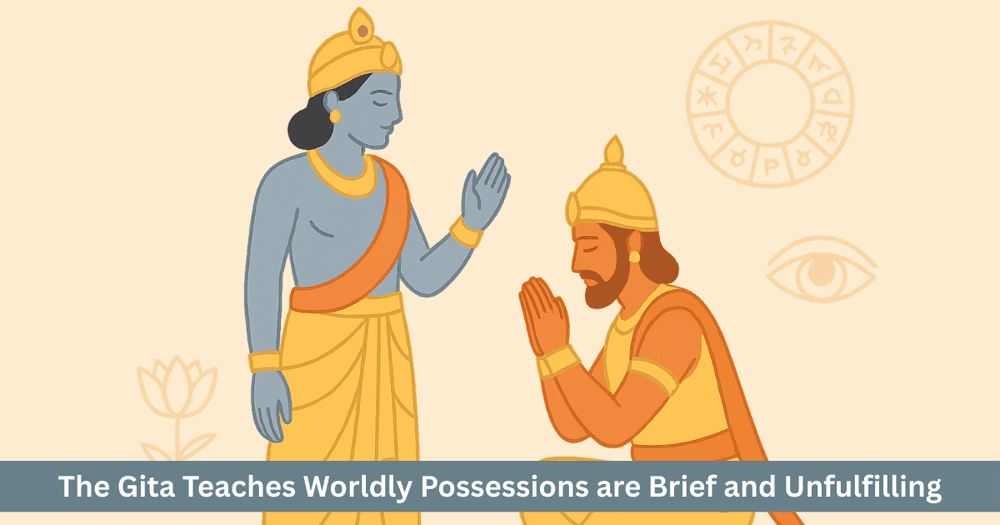Fear and its Explanation in the Bhagavad Gita: The Path from Soul’s Eternity to Liberation
By Pt. Nilesh Sharma
Causes of Fear and the Gita’s Remedies: A Journey Toward Fearlessness

Table of Contents
Fear is a complex and powerful human experience. In the Bhagavad Gita, Lord Krishna offers Arjuna profound methods to overcome fear and its consequent weaknesses. This article elaborates on the root causes of fear and its solution as explained in the Gita.
Fear Exists Because We Are Attached
Krishna states, “You grieve for those who should not be grieved for. The wise do not grieve for the living or the dead” (2.11). Fear and grief arise from attachment, to possessions, body, relationships or reputation. The Gita clarifies that these worldly possessions are temporary and do not truly belong to us. Only the soul is eternal, untouched by birth, death or change. Realizing this truth helps us detach and break free from fear born of clinging.
Fear Is a Product of the Mind
Fear largely arises as a psychological process where memories, imagination and uncertainty about the future combine to form vivid fears. The Gita teaches Krishna’s call to Arjuna to observe the mind’s turbulence as a witness. The soul is beyond mind and body and unaffected by passing states like fear or joy. When we identify as mind, fear feels real. With deep self-awareness, we realize fear is just a mental wave and we are the vast, calm ocean beneath.
Action Destroys Fear
Fear encourages inaction and hesitation with the hope of perfect fearlessness in future. The Gita counters this by emphasizing that courage and freedom from fear come through action, not waiting. Arjuna froze in dread but Krishna urged immediate action. Fear increases through overthinking and procrastination. By acting despite fear, we weaken fear’s hold and reclaim our power.
You Were Never the One in Control
Fear stems from a false belief in control. We think we can control every outcome and ensure safety. The Gita exposes this as maya, illusion, revealing life flows according to a cosmic order beyond our understanding. Our duty is to act sincerely without attachment to outcomes. Accepting this freedom from control dissolves fear’s power and offers peace.
Fear Is Small, You Are Not
Ultimately, the Gita reveals that fear is not part of the true self. The eternal Self is infinite and unshaken. Fear is a shadow cast by ego and conditioned thought. Those who realize their true identity as the soul rise above fear. Krishna’s call is to act courageously and watch fear dissolve like mist in sunlight, revealing the inner radiant freedom.
Final Reflection: From Illusion to Freedom
The Bhagavad Gita accepts fear as part of human experience but reveals it as a mental construction born of attachment, ignorance and illusion of control. Through knowledge, observation, right action, surrender and spiritual discipline, fear loses its dominion. Each fear points the seeker toward deeper self-knowledge and fearless living anchored in eternal truth. As Krishna assures Arjuna: courage is not absence of fear but the presence of wisdom beyond it.
Frequently Asked Questions
Question 1: Why does fear arise, according to the Gita?
Answer: Fear arises from attachment, mental projections, illusion of control and ignorance of the soul’s immortality.
Question 2: What is our true nature which transcends fear?
Answer: We are the eternal soul, unaffected by fear or pleasure.
Question 3: How does the Gita suggest overcoming fear?
Answer: By practicing Jnana Yoga, Karma Yoga, Bhakti Yoga and Dhyana Yoga.
Question 4: What does the Gita say about the illusion of control?
Answer: Control is a false notion; life follows a cosmic order and sincere action without attachment is the way.
Question 5: What characterizes a mind free from fear?
Answer: Such a mind remains steady amid joy and sorrow, gain and loss and faces death without fear.
Get your accurate Kundali
Generate KundaliDid you like it?
Author
Pt. Nilesh Sharma (45)
Experience: 25
Consults About: Career, Family, Marriage
Clients In: CG, MP, DL
Share this article with friends and family